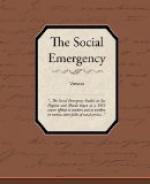A questionnaire answered by girls at the University of Oregon shows that, with few exceptions, plays and games were not indulged in throughout the high-school period and systematic playing ceased for the majority in the seventh and eighth grades. This custom prevails throughout the country. Just at the time when a girl needs abundant and free open-air play to develop the muscles, train endurance of the heart, and increase the capacity of the lungs, she omits it altogether. This is one of the chief factors in the anaemias and poor circulation common in that period. The derangement in the blood results in digestive disturbances and loss of appetite, followed by headache and lassitude which further disincline the girl for activity. Add to this the nervous strain incident to endeavors to carry on a successful social career, the nerve tension resulting from the unhygienic clothing assumed at this time, the lack of the steadying influence of home responsibilities, and we have ample cause for the nervous, high-strung girl who is becoming so common that we are in danger of regarding her as the normal girl.
So greatly has the school curriculum encroached upon the home that the girl has no longer time to share its responsibilities, nor is there longer time for the family reading-circle, or music, or games for the maintenance of the unity and fellowship of the home. This condition cannot but react unfavorably upon the nervous system. If the brain is not rested and the emotions satisfied by the relationships in the home, a feverish unrest, a nervous irritability, a futile search supplant the calmness of spirit, stableness of reactions and depth of contentment which must be long continued to become a habit of mind.
Our school systems of to-day are designed for a girl as strong physically as a boy; in fact stronger than most of our city boys. Our girls should possess as much vitality as our boys; but until we change our methods of dealing with girls, we must treat them as they exist and not as the normal individuals we hope some day to evolve. Most girls have disorders,—“nervousness,” headache, backache, constipation, colds, fatigue, or pain at the menstrual period. So common are these disturbances that we consult a physician only in extreme cases, and rarely seek the cause of the condition or attempt more than temporary relief. A pain which under ordinary circumstances would receive medical attention is viewed with resignation when coincident with the menses. As a consequence of this neglect, many girls suffer unnecessary drains upon their vitality.
We find all degrees of menstrual pain. It may be so mild as to be little more than discomfort, or so intense that unconsciousness results. The pain may be sharp and knife-like, or it may be a dull ache. It may be localized, low down in one or both sides, distributed over the whole abdomen or concentrated in the back. With this pain, there may be headache, or a headache may be the only symptom. Frequently there is gastro-intestinal disturbance—nausea, vomiting, diarrhoea, or constipation. In anaemic cases fainting is common.




